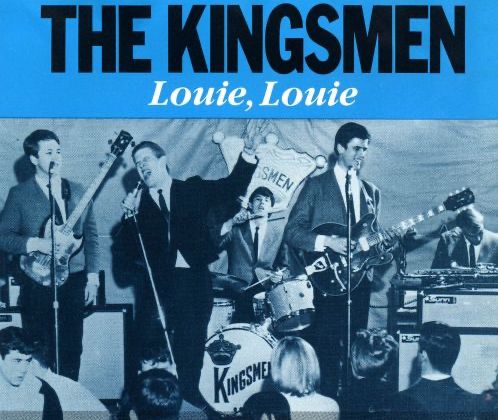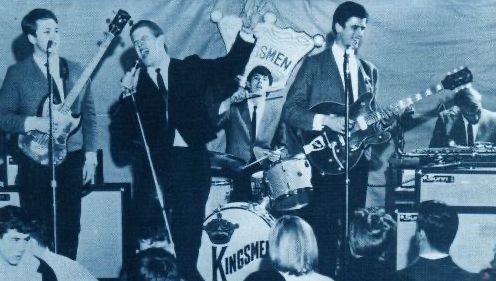 They’re all gone now, but at one time their hit recording sounded an alarm so loud that the FBI had them investigated. They were the Kingsmen, and their cover of an old R&B song called “Louie Louie,” which came close to topping the charts in America, made an older generation squirm in fear.
They’re all gone now, but at one time their hit recording sounded an alarm so loud that the FBI had them investigated. They were the Kingsmen, and their cover of an old R&B song called “Louie Louie,” which came close to topping the charts in America, made an older generation squirm in fear.
It all seems so silly now, in an era when explicit lyrics are accepted as business as usual, but at one time, more than 60 years ago, they served as proof to some stuffed-shirt types that rock and roll was dangerous, dirty music.
Even though no one seemed to know the words to the song.
The Kingsmen formed in Portland, Oregon, in 1959 with singer (and guitarist) Jack Ely, drummer Lynn Easton, bass guitarist Bob Nordby and lead guitarist Mike Mitchell. As teenagers, they played high school parties, teen dances and even supermarket openings and fashion shows. Like many fledgling bands of the day, they copied what they heard on the radio: Elvis Presley, the Ventures, country music, R&B and the burgeoning Northwest Sound. In 1962, keyboardist Don Gallucci was added to the lineup.
The garage-rock band started recording in 1963. Their first effort was “Louie Louie,” a song written and first recorded by Richard Berry in 1955, and played by virtually all Northwest rock and roll and R&B bands. The session cost a reported $36 at Portland’s Northwest Recorders. Jerry Dennon, a record producer in Seattle, pressed a few hundred copies on his regional label, Jerden. Northwest music fans were already familiar with the song from Berry’s version and a subsequent cover by a local band, the Wailers (1961).
The Kingsmen’s version found its way to the East Coast, where a couple of Boston radio stations played it, generating a huge response from listeners. Dennon entered into an agreement with New York’s Wand label for immediate mass pressing and distribution and “Louie Louie” rapidly broke out in several markets, climbing the charts.
As it began to drop in popularity, a controversy regarding the lyrics spread across America. The record was banned from sales and airplay in Indiana and elsewhere because teens countrywide thought the recording was riddled with obscene lyrics. That naturally stimulated even more interest, so much so that the FBI stepped in, investigating the band, following them as they crisscrossed the country for over a year until the recording was deemed “unintelligible.” Wand reissued the song in 1964 (and again in 1965 and 1966). The single ultimately reached #2 on the Hot 100.
The group rode the success to become a popular concert attraction, appearing in those years with such British Invasion acts as the Rolling Stones, the Zombies, the Kinks, Peter and Gordon, Chad and Jeremy and others, as well as North American acts the Beach Boys, the Righteous Brothers, the Isley Brothers, the Turtles, the Byrds and the Lovin’ Spoonful.
The Kingsmen were featured on the era’s top TV music shows, including Shindig, Hullabaloo, American Bandstand and Where The Action Is, and in the beach party movie, How to Stuff a Wild Bikini.
They earned subsequent chart success with a 1964 cover of “Money” (#16) and the novelty hit, “The Jolly Green Giant,” about the frozen foods character, which reached #4 in 1965.
Watch the Kingsmen perform in 1965, with lead singer Jack Ely explaining the controversy of the “Louie Louie” lyrics
Ely died in 2015 at age 71. Easton died in 2020. Mike Mitchell died April 16, 2021. The other early members have passed away as well.
“Louie Louie” is considered a classic of the early rock era today, and its lyrics no longer seem to strike much fear. The song itself has been inducted into the Rock and Roll Hall of Fame.
Related: The story behind another garage-rock classic, “Wild Thing”
The Kingsmen recordings are available here.


4 Comments
People now don’t realize what a big deal Louie Louie was but I remember playing the 45 at 16 rpm to try and decipher what they were singing,to no avail.
There were actually two different sets of lyrics. Clean & not so clean.
That is not Jack Ely singing in the video. That is Drummer Lynn Easton lip-syncing to Ely’s vocals.
The lyrics weren’t anywhere near as scary as J Edgar.